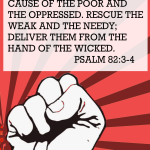
Our reading this week is from the gospel of Luke:
On one occasion when Jesus was going to the house of a leader of the Pharisees to eat a meal on the sabbath, they were watching him closely… When he noticed how the guests chose the places of honor, he told them a parable. “When you are invited by someone to a wedding banquet, do not sit down at the place of honor, in case someone more distinguished than you has been invited by your host; and the host who invited both of you may come and say to you, ‘Give this person your place,’ and then in disgrace you would start to take the lowest place.
Welcome Readers! Please subscribe to Social Jesus Here.
This is Part 1 of Humility, Inclusion, Power and Privilege
But when you are invited, go and sit down at the lowest place, so that when your host comes, he may say to you, ‘Friend, move up higher’; then you will be honored in the presence of all who sit at the table with you. For all who exalt themselves will be humbled, and those who humble themselves will be exalted.” He said also to the one who had invited him, “When you give a luncheon or a dinner, do not invite your friends or your brothers or your relatives or rich neighbors, in case they may invite you in return, and you would be repaid. But when you give a banquet, invite the poor, the crippled, the lame, and the blind. And you will be blessed, because they cannot repay you, for you will be repaid at the resurrection of the righteous.” (Luke 14:1, 7-14)
In this week’s reading, social location matters. Our reading includes the subjects of humility, recognition, and pride. This reading is not directed toward those for whom pride means a healthy concept of one’s own worth. In that sense, pride means you are worth just as much as everyone else. Our reading this week is rather about pride defined as someone feeling they are better than those around them. Not equal, but above. It is about seeking recognition and the places of highest honor above others.
In our story this week, Jesus is repeating principles well known in Jewish wisdom and the Hebrew scriptures. For example, in Proverbs 25:6-7 we read, “Do not put yourself forward in the king’s presence or stand in the place of the great; for it is better to be told, ‘Come up here,’ than to be put lower in the presence of a noble.” Similarly, we read in Proverbs 11:2: “When pride comes, then comes disgrace; but wisdom is with the humble.” And Psalm 18:27 states: “For you deliver a humble people, but the haughty eyes you bring down.”
Thematically, this teaching fits with Luke’s gospel. Luke’s version of the Jesus story began by reminding us that Luke’s Jesus would liberate those in marginalized social locations on the edges and undersides of his society. As Mary sings, “He has brought down the powerful from their thrones, and lifted up the lowly; he has filled the hungry with good things, and sent the rich away empty.” (Luke 1:52-53)
In our passage in Luke 14, Jesus advises his societally privileged listeners at a Sabbath meal at a Pharisee’s home to choose actions that reflect humility rather than hungering for recognition when recognition means they are elevated above those around them. Again, we shouldn’t confuse this with recognition that acknowledges someone’s validity, value, or job well done. There is a vast difference between the basic human need to be valued and estimated as being of equitable worth with others and the unhealthy desire to be esteemed by others as better than them or of a higher social status. Humility can be used by oppressors to keep the oppressed subjugated. It can also be used by the oppressed to confront their oppressors. We’ll take a look at the difference, in Part 2.
Are you receiving all of RHM’s free resources each week?
Begin each day being inspired toward love, compassion, justice and action. Free.
Sign up at HERE.















